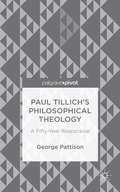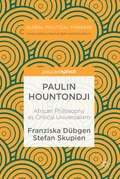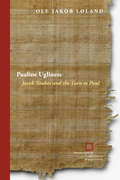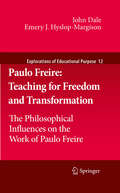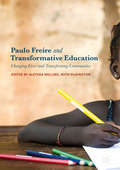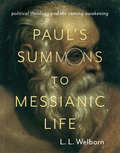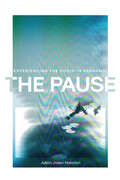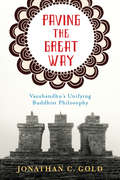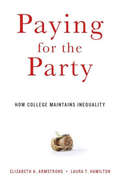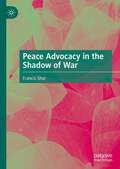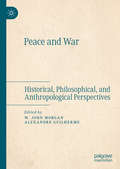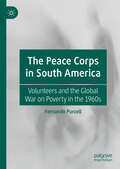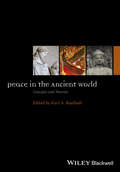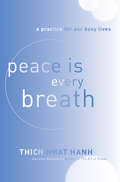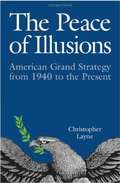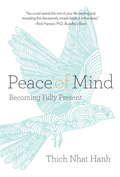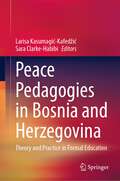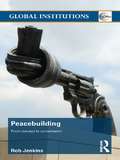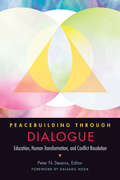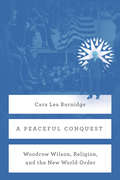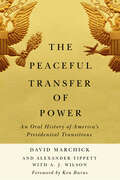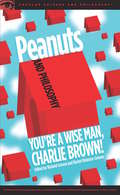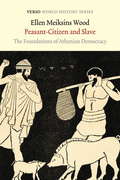- Table View
- List View
Paul Tillich’s Philosophical Theology: A Fifty-Year Reappraisal
by George PattisonPaul Tillich's Philosophical Theology takes up the challenge as to whether his thought remains relevant fifty years after his death. In opposition to those who believe that his writings have little to say to us today, this book argues that his thought is largely exemplary of open theological engagement with the contemporary intellectual situation.
Paulin Hountondji: African Philosophy as Critical Universalism (Global Political Thinkers)
by Franziska Dübgen Stefan SkupienPaulin J. Hountondji is one of the most important and controversial figures in contemporary African philosophy. His critique of ethnophilosophy as a colonial, exoticising and racialized undertaking provoked contentious debates among African intellectuals on the proper methods and scope of philosophy and science in an African and global context since the 1970s. His radical pledge for scientific autonomy from the global system of knowledge production made him turn to endogenous forms of practising science in academia. The horizon of his philosophy is the quest for critical universality from a historical, and situated perspective. Finally, his call for a notion of culture that is antithetical to political movements focused on a single identitarian doctrine or exclusionary norms shows how timely his political thought remains to this day. This book gives a comprehensive overview of Hountondji’s philosophical arguments and provides detailed information on the historical and political background of his intellectual oeuvre. It situates Hountondji in the dialogue with his African colleagues and explores links to current debates in philosophy, cultural studies, postcolonialism and the social sciences.
Pauline Ugliness: Jacob Taubes and the Turn to Paul (Perspectives in Continental Philosophy)
by Ole Jakob LølandIn recent decades Giorgio Agamben, Alain Badiou, and Slavoj Žižek have shown the centrality of Paul to western political and philosophical thought and made the Apostle a central figure in left-wing discourses far removed from traditional theological circles. Yet the recovery of Paul beyond Christian theology owes a great deal to the writings of the Jewish rabbi and philosopher Jacob Taubes (1923–1987). Pauline Ugliness shows how Paul became an effective tool for Taubes to position himself within European philosophical debates of the twentieth century. Drawing on Nietzsche’s polemical readings of the ancient apostle as well as Freud’s psychoanalysis, Tabues developed an imaginative and distinct account of political theology in confrontations with Carl Schmitt, Theodor Adorno, Hans Blumenberg, and others. In a powerful reconsideration of the apostle, Taubes contested the conventional understanding of Paul as the first Christian who broke definitively with Judaism and drained Christianity of its political potential. As a Jewish rabbi steeped in a philosophical tradition marked by European Christianity, Taubes was, on the contrary, able to emphasize Paul’s Jewishness as well as the political explosiveness of his revolutionary doctrine of the cross.This book establishes Taubes’s account of Paul as a turning point in the development of political theology. Løland shows how Taubes identified the Pauline movement as the birth of a politics of ugliness, the invention of a revolutionary criticism of the ‘beautiful’ culture of the powerful that sides instead with the oppressed.
Paulo Freire: Teaching for Freedom and Transformation
by John Dale Emery J. Hyslop-MargisonThe primary mission of this text is clarifying many of the misconceptions about Paulo Freire's theories, concepts and his implications for education. It revisits his ideas and explains more fully the philosophical influences that shaped concepts such as problem posing, conscientization and praxis. The fundamental thesis, then, is that the present absence of in-depth philosophical analysis leaves an unacceptable void in the literature addressing Freire's work, while also promoting frequent misconceptions and superficial understandings about his relationship to contemporary education. Indeed, the philosophical assumptions contributing to Freire's critical pedagogy require identification, unravelling and ultimately evaluation on the basis of their epistemic and moral tenability. Most existing applications of Freire's pedagogy are unfortunately superficial because they simply sloganize terms such as banking education, conscientization, praxis, and humanization. A slogan in education popularizes a concept or idea in a positive way, but offers very little in terms of critical reflection or analysis. In order to understand these terms and their origin and apply them as Freire intended, a far richer and more in depth examination of Freire is desperately needed. This text will provide precisely that type of examination.
Paulo Freire and Transformative Education: Changing Lives And Transforming Communities
by Ruth Pilkington Alethea MellingThis book brings together a range of global and local themes inspired by the work of Paulo Freire. Freire believed in the possibility of change, rejecting the neoliberal discourse that presents poverty as inevitable: his core principle emphasised the prerogative of transforming the world, rather than adapting to an unethical world order. This responsibility to intervene in reality as educators is explored in detail in this edited collection. Including such diverse themes as pedagogical approaches to globalisation, social mobility, empowerment and valuing diversity within communities, the volume is highly relevant to pedagogical practice. Sharing the transformative power of ‘being’ through popular education and the solidarity economy, this innovative book will be of interest to scholars of Paulo Freire, transformative education and diversity in education.
Paul's Summons to Messianic Life: Political Theology and the Coming Awakening (Insurrections: Critical Studies in Religion, Politics, and Culture)
by L. WelbornTaubes, Badiou, Agamben, i ek, Reinhard, and Santner have found in the Apostle Paul's emphasis on neighbor-love a positive paradigm for politics. By thoroughly reexamining Pauline eschatology, L. L. Welborn suggests that neighbor-love depends upon an orientation toward the messianic event, which Paul describes as the "now time" and which he imagines as "awakening." Welborn compares the Pauline dialectic of awakening to attempts by Hellenistic philosophers to rouse their contemporaries from moral lethargy and to the Marxist idea of class consciousness, emphasizing the apostle's radical spirit and moral relevance.
Paul's Summons to Messianic Life
by L. L. WelbornTaubes, Badiou, Agamben, Žižek, Reinhard, and Santner have found in the Apostle Paul's emphasis on neighbor-love a positive paradigm for politics. By thoroughly reexamining Pauline eschatology, L. L. Welborn suggests that neighbor-love depends upon an orientation toward the messianic event, which Paul describes as the "now time" and which he imagines as "awakening." Welborn compares the Pauline dialectic of awakening to attempts by Hellenistic philosophers to rouse their contemporaries from moral lethargy and to the Marxist idea of class consciousness, emphasizing the apostle's radical spirit and moral relevance.
The Pause: Experiencing Time Interrupted
by Julian Jason HaladynWhen COVID-19 spread across the globe, people experienced protection measures such as social distancing, self-isolation, and self-quarantine as a kind of shutting down or putting on hold of life. Many referred to this experience as a pause.Calling attention to the long history of grappling with pausing in writing on plagues and pandemics, Julian Haladyn explores the pause in its social, political, and personal manifestations over the extended pandemic. The schism between the virus and its prohibitions on human engagement with the world produced a crisis, Haladyn argues, in which, for an extended time, it was impossible to imagine a future. The Pause is a cultural inquiry into a moment when human life around the globe seemed to halt, as well as the social symptoms that defined it.The Pause captures the experience of being inside the pandemic, even as that experience continues to unfold. It regards our current situation not for what it may become in the future, but rather as a moment of mass uncertainty and existential hesitation.
Paving the Great Way
by Jonathan GoldFeaturing close studies of Vasubandhu's Abhidharmakosabhasya, Vyakhyayukti, Vimsatika, and Trisvabhavanirdesa, among other works, this book identifies recurrent treatments of causality and scriptural interpretation that unify distinct strands of thought under a single, coherent Buddhist philosophy
Paving the Great Way: Vasubandhu's Unifying Buddhist Philosophy
by Jonathan C. GoldThe Indian Buddhist philosopher Vasubandhu (fourth–fifth century C.E.) is known for his critical contribution to Buddhist Abhidharma thought, his turn to the Mahayana tradition, and his concise, influential Yogacara–Vijñanavada texts. Paving the Great Way reveals another dimension of his legacy: his integration of several seemingly incompatible intellectual and scriptural traditions, with far-ranging consequences for the development of Buddhist epistemology and the theorization of tantra.Most scholars read Vasubandhu's texts in isolation and separate his intellectual development into distinct phases. Featuring close studies of Vasubandhu's Abhidharmakosabhasya, Vyakhyayukti, Vimsatika, and Trisvabhavanirdesa, among other works, this book identifies recurrent treatments of causality and scriptural interpretation that unify distinct strands of thought under a single, coherent Buddhist philosophy. In Vasubandhu's hands, the Buddha's rejection of the self as a false construction provides a framework through which to clarify problematic philosophical issues, such as the nature of moral agency and subjectivity under a broadly causal worldview. Recognizing this continuity of purpose across Vasubandhu's diverse corpus recasts the interests of the philosopher and his truly innovative vision, which influenced Buddhist thought for a millennium and continues to resonate with today's philosophical issues. An appendix includes extensive English-language translations of the major texts discussed.
Paying for the Party
by Elizabeth A. Armstrong Laura T. HamiltonTwo young women, dormitory mates, embark on their education at a big state university. Five years later, one is earning a good salary at a prestigious accounting firm. With no loans to repay, she lives in a fashionable apartment with her fiancé. The other woman, saddled with burdensome debt and a low GPA, is still struggling to finish her degree in tourism. In an era of skyrocketing tuition and mounting concern over whether college is “worth it,” Paying for the Party is an indispensable contribution to the dialogue assessing the state of American higher education. A powerful exposé of unmet obligations and misplaced priorities, it explains in vivid detail why so many leave college with so little to show for it. Drawing on findings from a five-year interview study, Elizabeth Armstrong and Laura Hamilton bring us to the campus of “MU,” a flagship Midwestern public university, where we follow a group of women drawn into a culture of status seeking and sororities. Mapping different pathways available to MU students, the authors demonstrate that the most well-resourced and seductive route is a “party pathway” anchored in the Greek system and facilitated by the administration. This pathway exerts influence over the academic and social experiences of all students, and while it benefits the affluent and well-connected, Armstrong and Hamilton make clear how it seriously disadvantages the majority. Eye-opening and provocative, Paying for the Party reveals how outcomes can differ so dramatically for those whom universities enroll.
Peace Advocacy in the Shadow of War
by Francis ShorFor peace advocates a corollary to Clausewitz’s dictum that “war is politics by other means” might be that other politics could prevent war. By highlighting both individual peace advocates and antiwar/peace organizations from World War I through the wars of the 21st century, the chapters will provide insights into how these individuals and organizations articulated their opposition to and mobilized against specific wars and international/regional conflicts. Organized roughly in chronological order, each chapter will illuminate the socio-historical conditions under which such peace advocacy contested state aggression and armed combat at the national and/or transnational levels. Beyond understanding the specific socio-historical circumstances within which these antiwar and peace advocates and organizations operated and their resultant achievements and failures, the book as a whole will examine the kind of politics that perpetuate war and those that offer a challenge to that perpetuation. Scholars, students, and the general public interested in the history of modern and contemporary wars, peace and conflict studies, and ethical/political perspectives in the 20th and 21st centuries should find much to reflect upon in this book.
Peace and War: Historical, Philosophical, and Anthropological Perspectives
by W. John Morgan Alexandre GuilhermePeace and War: Historical, Philosophical, and Anthropological Perspectives is an accessible, higher-level critical discussion of philosophical commentaries on the nature of peace and war. It introduces and analyses various philosophies of peace and war, and their continuing theoretical and practical relevance for peace studies and conflict resolution. Using a combination of both historical and contemporary philosophical perspectives, the book is at once eclectic in its approach and broad in its inquiry of these enduring phenomena of human existence.
The Peace Corps in South America: Volunteers and the Global War on Poverty in the 1960s
by Fernando PurcellIn the 1960s, twenty-thousand young Americans landed in South America to serve as Peace Corps volunteers. The program was hailed by President John F. Kennedy and by volunteers themselves as an exceptional initiative to end global poverty. In practice, it was another front for fighting the Cold War and promoting American interests in the Global South. This book examines how this ideological project played out on the ground as volunteers encountered a range of local actors and agencies engaged in anti-poverty efforts of their own. As they negotiated the complexities of community intervention, these volunteers faced conflicts and frustrations, struggled to adapt, and gradually transformed the Peace Corps of the 1960s into a truly global, decentralized institution. Drawing on letters, diaries, reports, and newsletters created by volunteers themselves, Fernando Purcell shows how their experiences offer an invaluable perspective on local manifestations of the global Cold War.
Peace In The Ancient World: Concepts And Theories
by Kurt A. RaaflaubPeace in the Ancient World: Concepts and Theories conducts a comparative investigation of why certain ancient societies produced explicit concepts and theories of peace and others did not. Explores the idea that concepts of peace in antiquity occurred only in periods that experienced exceptional rates of warfare Utilizes case studies of civilizations in China, India, Egypt, and Greece Complements the 2007 volume War and Peace in the Ancient World, drawing on ideas from that work and providing a more comprehensive examination
Peace Is Every Breath
by Thich Nhat HanhIn his travels around the country and the world, Zen master and international bestselling author Thich Nhat Hanh witnessed a growing unhappiness among the many people he encountered. He saw the hectic pace of our day-to-day lives taking a toll on our health and well-being. In response, the renowned teacher sat down to write Peace Is Every Breath, a book that makes the core teachings of Buddha accessible for everyone. In this jewel of a book, Thich Nhat Hanh does not suggest that we escape from reality and put our busy lives on hold. Far from it. Instead, he provides the insight and tools we need to incorporate the practice of mindfulness into our every waking moment. Thich Nhat Hanh shows us how we can transcend the mad rush of our days and discover within the here and now our own innate ability to experience inner peace and happiness. Offering personal anecdotes, meditations, and advice for mindfully connecting with our present experience, Thich Nhat Hanh guides us around potential pitfalls along the way. We do not need to escape reality to harness the joy and peace that is possible with every breath we take--the power of mindfulness can heal us from the suffering caused by the many stresses that surround us. Including original calligraphy by Thich Nhat Hanh, Peace Is Every Breath is a timely book filled with timeless wisdom and practical advice that is destined to become a classic.
The Peace of Illusions: American Grand Strategy from 1940 to the Present
by Christopher LayneIn a provocative book about American hegemony, Christopher Layne outlines his belief that U.S. foreign policy has been consistent in its aims for more than sixty years and that the current Bush administration clings to mid-twentieth-century tactics.
Peace of Mind
by Thich Nhat HanhWe can’t heal with our minds alone. Thinking can be something productive and creative, but without integrating body and mind, much of our thinking is useless and unproductive. In Peace of Mind, Zen master Thich Nhat Hanh reminds us that integrating body and mind is the only way to be fully alive in each moment, without getting lost in our thoughts while walking, cooking, driving, and going about our everyday lives. Only by cultivating a mindful body and an embodied mind can we be fully alive. Bringing together ancient wisdom and contemporary thinking, Thich Nhat Hanh says it's like hardware and software—if you don't have both, you can't do anything.Peace of Mind provides a foundation for beginning mindfulness practices and understanding the principles of mind/body awareness. By learning how our physical body and mind are inseparable in creating our own perceptions and experiences we can begin to trust and nourish our ability to create well-being.
Peace Pedagogies in Bosnia and Herzegovina: Theory and Practice in Formal Education
by Larisa Kasumagić-Kafedžić Sara Clarke-HabibiThis collection presents interdisciplinary perspectives on educating for peace in Bosnia and Herzegovina. It explores a range of theories, contexts, pedagogies and practices within formal education settings and draws attention to the multiple roles that teachers play in fostering socially transformative learning. The volume offers readers a critical exploration of peace pedagogy as an imagined ideal and fluid space between post-war educational politics, institutional and curricular constraints, and the lived experiences and identities of teachers and students in socially and historically situated communities. The book highlights local voices, initiatives and practices by illustrating good examples of how classrooms are being connected to communities, teacher education programs and teachers’ continued professional development. It demonstrates why and how the grammars of peace in Bosnia and Herzegovina are still in a state of flux and negotiation, and what the implications are for classroom practice and pedagogy. Recommendations are offered for policymakers, curriculum developers, teacher educators and teachers on how peace pedagogies can be promoted at all levels of the education system and through pre-service and in-service teacher education, taking into account the structural uniqueness of the country.
Peacebuilding: From Concept to Commission (Global Institutions)
by Robert JenkinsThe emergence of The United Nations Peacebuilding Commission (PBC) in 2005 was the culmination of a long and contentious process. In this work Rob Jenkins provides a concise introduction that traces the origins and evolution of peacebuilding as a concept, the creation and functioning of the PBC as an institution, and the complicated relationship between these two processes. Jenkins discusses how continued contestation over what exactly peacebuilding is, and how its objectives can most effectively be achieved, influenced the institutional design and de facto functioning of the PBC, its structure, mandate and origins. He then moves on to examine the peacebuilding architecture in action and analyses the role that the PBC has carved out for itself, reflecting on the future prospects for the organization. The theory and practice of peacebuilding has assumed increasing importance over the last decade, and this work is essential reading for all students of conflict resolution, peace studies and international relations.
Peacebuilding through Dialogue: Education, Human Transformation, and Conflict Resolution
by Peter N. StearnsThis volume examines the many dimensions of dialogue as a key driver of peaceful personal and social change. While most people agree on the value of dialogue, few delve into its meaning or consider its full range. The essays collected here consider dialogue in the context of teaching and learning, personal and interpersonal growth, and in conflict resolution and other situations of great change. Through these three themes, contributors from a wide variety of perspectives consider the different forms dialogue takes, the goals of the various forms, and which forms have been most successful or most challenging. With its expansive approach, the book makes an original contribution to peace studies, civic studies, education studies, organizational studies, conflict resolution studies, and dignity studies. Contributors: Susan H. Allen, George Mason University * Monisha Bajaj, University of San Francisco * Andrea Bartoli, Seton Hall University * Meenakshi Chhabra, Lesley University * Steven D. Cohen, Tufts University * Charles Gardner, Community of Sant’Egidio * Mark Farr, The Sustained Dialogue Institute * William Gaudelli, Teachers College, Columbia University * Jason Goulah, DePaul University * Donna Hicks, Harvard University * Bernice Lerner, Hebrew College * Ceasar L. McDowell, MIT * Gonzalo Obelleiro, DePaul University * Bradley Siegel, Teachers College, Columbia University * Olivier Urbain, Min-On Music Research Institute * Ion Vlad, University of San FranciscoDistributed for George Mason University Press and published in collaboration with the Ikeda Center for Peace, Learning, and Dialogue
A Peaceful Conquest: Woodrow Wilson, Religion, and the New World Order
by Cara Lea BurnidgeA century after his presidency, Woodrow Wilson remains one of the most compelling and complicated figures ever to occupy the Oval Office. A political outsider, Wilson brought to the presidency a distinctive, strongly held worldview, built on powerful religious traditions that informed his idea of America and its place in the world. With A Peaceful Conquest, Cara Lea Burnidge presents the most detailed analysis yet of how Wilson's religious beliefs affected his vision of American foreign policy, with repercussions that lasted into the Cold War and beyond. Framing Wilson's intellectual development in relationship to the national religious landscape, and paying greater attention to the role of religion than in previous scholarship, Burnidge shows how Wilson's blend of Southern evangelicalism and social Christianity became a central part of how America saw itself in the world, influencing seemingly secular policy decisions in subtle, lasting ways. Ultimately, Burnidge makes a case for Wilson's religiosity as one of the key drivers of the emergence of the public conception of America's unique, indispensable role in international relations. As the presidential election cycle once again raises questions of America's place in the world, A Peaceful Conquest offers a fascinating excavation of its little-known roots.
The Peaceful Transfer of Power: An Oral History of America’s Presidential Transitions (Miller Center Studies on the Presidency)
by David Marchick Alexander Tippett A. J. WilsonRonald Reagan called the peaceful transfer of power from one U.S. president to the next a miracle, and it is. It is also the most delicate and hazardous period in the entire political cycle. Americans learned the stakes in 2020, when President Donald Trump’s refusal to trigger the formal start of the transition process to President-Elect Joe Biden created perhaps the worst crisis for American democracy since the Civil War. Even at the best of times, an incoming administration faces a gargantuan task, as every new president must make more than four thousand political appointments in a short period of time.Yet the day-to-day process of presidential transitions remains poorly understood, even by government specialists. This is why the Partnership for Public Service’s Center for Presidential Transition created Transition Lab, a one-year podcast series that ran through January 2021. The Peaceful Transfer of Power now puts those distinct interviews with scholars, journalists, public servants, and—most important—participants in every transition from Ford–Carter to Trump–Biden into a narrative format that illuminates the long history, complexity, and current best practices associated with this most vital of democratic institutions.Presidential transitions stand at a critical juncture here and abroad. Highly readable and deeply informative, this book offers every citizen invested in safeguarding our democracy accessible and concentrated insights that will help future transitions run better, faster, and more smoothly.The Partnership for Public Service is a nonprofit, nonpartisan organization that is building a better government and a stronger democracy.
Peanuts and Philosophy
by Rachel Robison-Greene Richard GreeneIn Peanuts and Philosophy, twenty philosophers, from a diverse range of perspectives, look at different aspects of the Peanuts canon. How can the thoughts of children, who have yet to become grown-up, help us to become more grown up ourselves? Do we get good results from believing in something like the Great Pumpkin, even though we're disappointed every time? What can Linus's reactions to the leukemia of his friend Janice tell us about the stages of grief? Why don't we settle what's right and what's wrong by the simple method of asking Lucy? Is true happiness attainable without a warm puppy? Do some people's kites have a natural affinity for trees? Is Sally an anarchist, a nihilist, or just a contrarian? Does Linus's reliance on his blanket help him or hurt him? Is Charlie Brown's philosophy of life pathetic or inspirational?Other topics include: how the way children think carries general lessons about transcending our limitations; the Utopian quest as illustrated by Charlie's devotion to the Little Red-Haired Girl; Snoopy's Red Baron and history as selective memory; the Head Beagle as Big Brother. And, as we would expect, Lucy's repeated cruel removal of Charlie's football has several philosophical applications.
Peasant-Citizen and Slave
by Ellen Meiksins WoodThe controversial thesis at the center of this study is that, despite the importance of slavery in Athenian society, the most distinctive characteristic of Athenian democracy was the unprecedented prominence it gave to free labor. Wood argues that the emergence of the peasant as citizen, juridically and politically independent, accounts for much that is remarkable in Athenian political institutions and culture. From a survey of historical writings of the eighteenth and nineteenth centuries, the focus of which distorted later debates, Wood goes on to take issue with influential arguments, such as those of G.E.M. de Ste Croix, about the importance of slavery in agricultural production. The social, political and cultural influence of the peasant-citizen is explored in a way which questions some of the most cherished conventions of Marxist and non-Marxist historiography.
